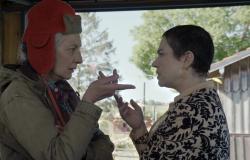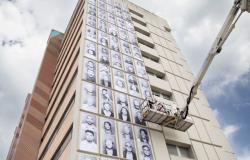essential
Former teacher, president of the Castelsarrasinois heritage association (ASPC), and a figure of social struggles from May 68 in Castelsarrasin, Bernard Ouardes devoted his life to exhuming the forgotten figures and the buried stories of his city. He died on May 2, 2025, at the age of 81.
In Castelsarrasin, In Tarn-et-Garonne, The name of Bernard Ouardes immediately evokes the defense of heritage, the taste for archives, loyalty to the humble, a frank word and a flawless passion for local history.
This man with an atypical journey, professor of history – geography who has become an insurer, self -taught historian and active president of the Pastelsarrasinois heritage association (ASPC) for more than fifteen years, died on May 2, at the age of 81, after a long illness.
Born December 19, 1943 in Lafrançaise, in a modest family in Tarn-et-Garonne, Bernard Ouardes has never forgotten his roots. Very early attracted by history and the debate of ideas, he committed from his youth.
In May 1968, while he was an external supervisor at the Jean-de-Prades high school, he actively participated in mobilizations and founded a union in the wake of student and high school movements. He will retain all his life this militant, demanding, often critical, but always constructive vein.
A detour by teaching and an assumed turn
This same high school will later become its place of teaching. Bernard Ouardes teaches history there with a freedom of tone that contrasts. In 1971, for the centenary of the commune of Paris, he obtained a rare exemption to devote an entire year to this revolutionary episode.
But it is a fortuitous meeting with a local insurer who shakes up his career. Attracted by a more autonomous professional life, he leaves national education and takes over an insurance firm, place Lamothe-Cadillac in Castelsarrasin. This bifurcation, far from keeping him away from history, offers him a freer framework to dig his research and travel.
The defender of local heritage
In 2007, at the age of 61, he joined the ASPC. Two years later, he took over it. The association becomes under its impetus a local history laboratory. He doubles the workforce, develops a series of rigorous conferences and publications, often unpublished. He exhumes, documents, and challenges. “I am not malleable, I chew everything and I assume what I say,” he confided to The dispatch In 2021.
It is in the archives of the Sainte-Marguerite metallurgical factory in Castelsarrasin that he makes a discovery that he considers as essential: that of Henri Pottevin, Castelsarrasinois who became a leading scientist, collaborator of Pastor, inventor of a gas mask during the First World War, and elected radical-socialist. Bernard Ouardes pleads for his public rehabilitation to the mayor of the time Bernard Dagen: the municipal council hall was inaugurated in his name in 2008, thanks to his work.
He also gives life to another forgotten: Paul Vasilières, historian and scholarly archaeologist, author of a monumental manuscript retracing a thousand years of local history. “A golden mine,” he said, too often pillaged without recognition.
Intransigence at the service of historical truth
Bernard Ouardes was not a man to compare with history. He criticized the municipal choices which, in his eyes, splendid the historical rigor. He notably opposed the rehabilitation of the Maison Despagne, which became Firmin-Bouisset Museum, denouncing a project that ignored the local architectural and artistic heritage. He militated with perseverance to have the Castelsarrasinois engraver Antonin-Delzers, Rome Prize in 1900, recognized rather than the Moissagais Bouisset artist.
The current mayor, Jean-Philippe Bésiers, with whom he had fed disagreements, will eventually give him right by attributing the name of Antonin-Delzers to a temporary exhibition hall of the museum. Despite the differences, the first councilor praised publicly on his account Facebook The memory of Bernard Ouardes: “Thank you Mr. Ouardes for what you have brought by your research and your knowledge on Castelsarrasin and its history.”
A living memory
Bernard Ouardes leaves a multiple work: publications, conferences, but also fights for the transmission and recognition of local memory. Through his writings, his discoveries, his alerts, he helped write another story of Castelsarrasin: that of anonymous, forgotten inventors, popular and scientific trajectories that official history often neglects.
Behind the man with settled convictions, a more nuanced profile was emerging: that of a memory passer, a scrupulous archivist, a sincere lover of his city. “If we don’t make books, we die,” he liked to say. He left several including this tasty entitled The tolerance houses in Castelsarrasin from 1848 to 1946.
To his wife Jackie, to his children, to his traveling companions of the ASPC, the editorial staff of La Dépêche sends its saddened condolences.






